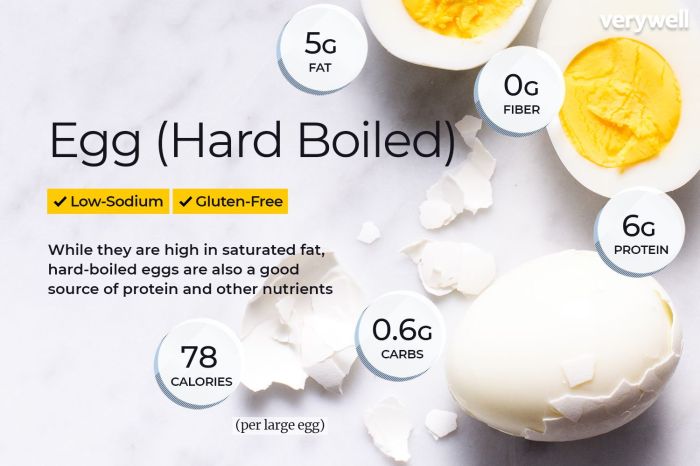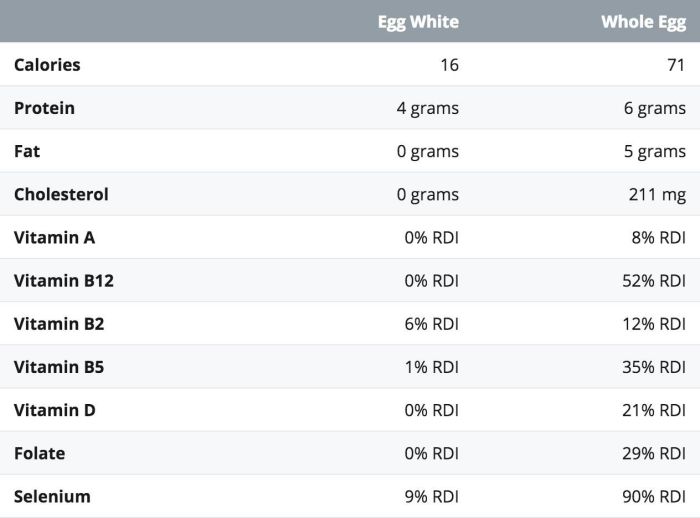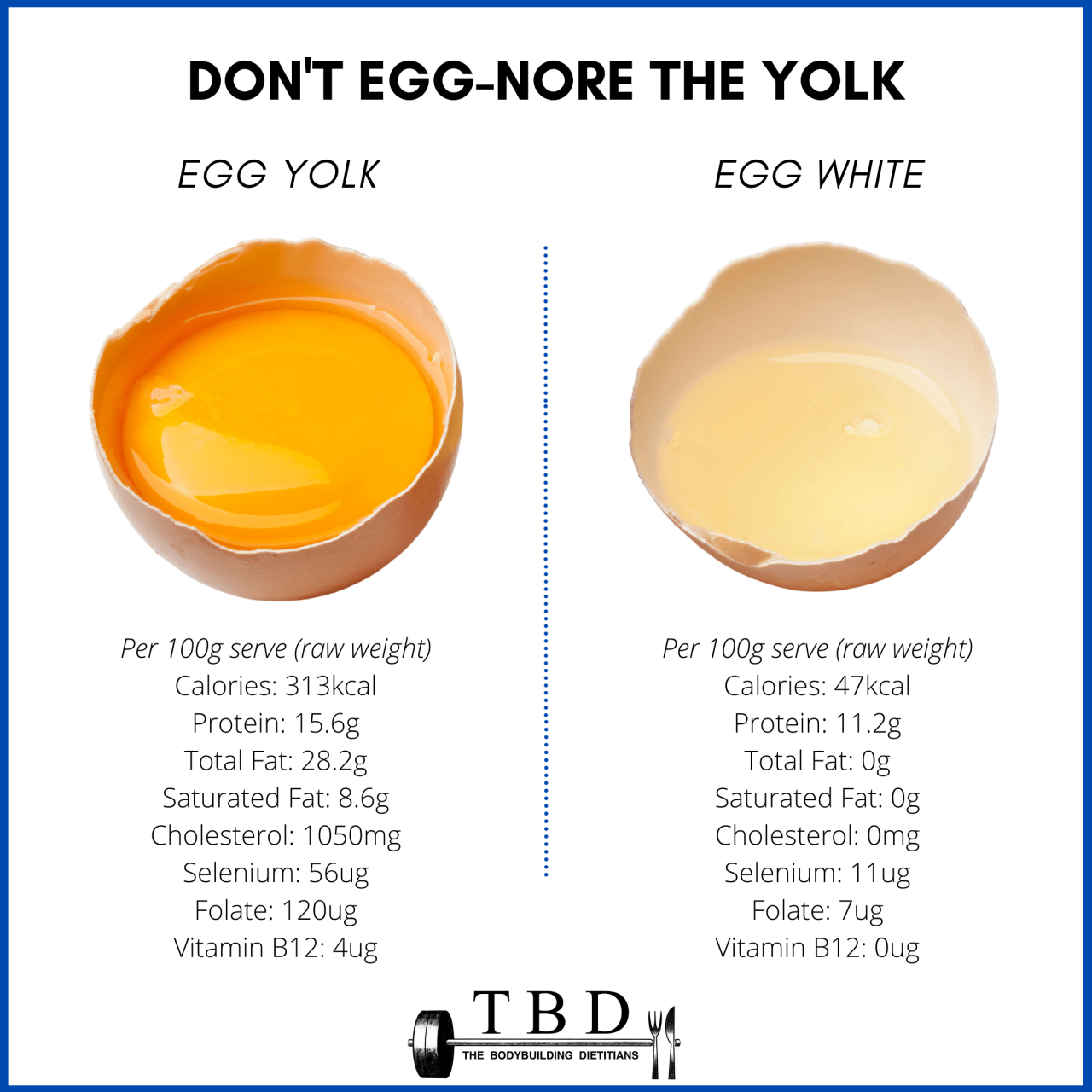Macronutrient Breakdown of 1 Cup Egg Whites
1 cup of egg white nutrition facts – Alright, folks, let’s dive into the nutritional powerhouse that is one cup of egg whites! We’re talking serious gains, whether you’re a fitness fanatic or just looking to up your protein game. Forget the yolk for now; we’re focusing on the lean, mean, protein-packed machine that is the egg white. Think of it as the Beyoncé of breakfast – all killer, no filler.
One cup of egg whites is practically a protein party in a glass (or bowl, whatever your preference). But let’s get down to the nitty-gritty, the numbers, the cold hard facts. We’re breaking down the macronutrients – protein, carbs, and fat – so you can see exactly what you’re working with.
Macronutrient Composition of One Cup of Egg Whites
Here’s the lowdown on the macronutrient breakdown, presented in a way that’s easier to digest than, well, an actual egg white (just kidding, egg whites are delicious!):
| Nutrient | Amount | Unit | % Daily Value (%DV) |
|---|---|---|---|
| Protein | 30-35 | grams | 60-70% |
| Carbohydrates | <1 | gram | <1% |
| Fat | <1 | gram | <1% |
Note: The exact values can vary slightly depending on the size of the eggs and other factors. These figures represent a reasonable approximation for a standard cup of egg whites.
Protein Content and Amino Acid Profile
Let’s talk protein – the real MVP here. Egg whites are a complete protein source, meaning they contain all nine essential amino acids your body needs but can’t produce on its own. Think of it like a perfectly balanced protein smoothie, but way more natural. These amino acids are highly bioavailable, meaning your body can easily absorb and utilize them for muscle growth, repair, and overall bodily functions.
It’s like a VIP pass to protein perfection.
Comparison to Other Protein Sources
So, how do egg whites stack up against other popular protein sources? Let’s pit them against some heavy hitters: chicken breast and tofu.
Egg Whites: High protein, very low in fat and carbs. Think of it as the lean, mean, protein machine. Perfect for those looking to maximize protein intake with minimal fat and carbs. Like the ultimate fitness star.
Chicken Breast: A solid contender, also high in protein, but with a slightly higher fat content compared to egg whites. A good all-around choice, but maybe not the best if you’re aiming for ultra-low fat.
A cup of egg whites boasts a powerhouse of protein, low in fat and calories, making it a dieter’s dream. However, if you’re craving something sweet, understanding the nutritional breakdown is key; comparing it to something like oreo balls nutrition facts highlights the stark difference. Returning to the egg whites, their high protein content supports muscle growth and satiety, unlike the sugar rush from those decadent oreo balls.
Tofu: A vegetarian’s best friend, tofu is a good source of protein, but its amino acid profile isn’t as complete as egg whites or chicken breast. Plus, it’s a bit higher in carbohydrates.
Ultimately, the “best” protein source depends on individual dietary needs and preferences. But egg whites definitely deserve a spot on the podium for their impressive protein punch.
Micronutrient Content of 1 Cup Egg Whites

Okay, so you’ve got the macro breakdown of egg whites – the big guns like protein, carbs, and fats. But let’s get into the
real* MVPs
the micronutrients. These are the vitamins and minerals that, while present in smaller amounts, play a HUGE role in keeping your body running like a well-oiled, protein-packed machine. Think of them as the secret sauce that makes your health goals pop.Egg whites aren’t just a blank canvas for protein; they’re a surprisingly good source of various essential vitamins and minerals that contribute to your overall health and well-being.
They’re like the unsung heroes of the breakfast club – always there, always supporting, always delivering the goods.
Vitamins and Minerals in Egg Whites
One cup of egg whites packs a punch when it comes to essential vitamins and minerals. These nutrients are vital for various bodily functions, from energy production to immune system support. Think of them as the power-ups in your health video game.
- Riboflavin (Vitamin B2): Crucial for energy metabolism and healthy skin.
- Niacin (Vitamin B3): Supports cell function and DNA repair. Think of it as your body’s built-in repair crew.
- Vitamin B12: Essential for nerve function, red blood cell formation, and DNA synthesis. It’s the ultimate multitasking vitamin.
- Selenium: A powerful antioxidant that protects cells from damage. Your body’s personal shield against free radicals.
- Potassium: Helps regulate blood pressure and muscle contractions. Keeps your heart happy and your muscles strong.
Detailed Micronutrient Breakdown
Let’s break down the nutritional power of one cup of egg whites in a table that’s easier to digest than, well, an entire carton of egg whites.
| Micronutrient | Amount (Approximate) | Unit | Health Benefit |
|---|---|---|---|
| Riboflavin (Vitamin B2) | 0.1 mg | milligrams | Energy metabolism, healthy skin |
| Niacin (Vitamin B3) | 0.5 mg | milligrams | Cell function, DNA repair |
| Vitamin B12 | 0.2 mcg | micrograms | Nerve function, red blood cell formation, DNA synthesis |
| Selenium | 15 mcg | micrograms | Antioxidant protection |
| Potassium | 60 mg | milligrams | Blood pressure regulation, muscle function |
Practical Applications and Culinary Uses of Egg Whites: 1 Cup Of Egg White Nutrition Facts

One cup of egg whites – that’s a serious amount of protein power! Forget the yolk-obsessed days; we’re diving into the versatile world of pure egg white goodness. From fluffy omelets to decadent meringues, the possibilities are as endless as your fitness goals (or your sweet tooth). Let’s explore how you can whip up some culinary magic with this protein powerhouse.Egg whites offer a unique culinary experience due to their high protein content and lack of fat.
This translates to lighter, fluffier textures in baked goods and leaner, healthier options in savory dishes. The absence of yolk also means a milder flavor profile, making them incredibly adaptable to various cuisines and flavor combinations. Mastering egg white cooking techniques unlocks a whole new level of culinary creativity.
Cooking Methods for Egg Whites
Egg whites respond beautifully to various cooking methods, each yielding a distinct texture and flavor. Whipping egg whites to stiff peaks creates a light and airy texture perfect for meringues and soufflés. Gentle scrambling results in a tender, moist texture, while a quick sauté yields a firmer, slightly chewy bite. Baking egg whites incorporates them into cakes and other desserts, contributing to a moist and light crumb.
Steaming is a healthy way to cook egg whites, preserving their nutrients and yielding a delicate, soft texture.
Recipes Utilizing One Cup of Egg Whites
One cup of egg whites is enough to create a variety of dishes. Here are a few examples showcasing both sweet and savory applications. Remember, these are just starting points; feel free to experiment and personalize them to your taste!
- Savory: A fluffy, protein-packed omelet bursting with your favorite veggies and cheese. Imagine a vibrant mix of spinach, mushrooms, and feta, all held together by light and airy egg whites.
- Savory: A batch of savory egg white muffins, perfect for meal prep. Think mini quiches with diced ham, cheese, and herbs – a great grab-and-go breakfast or snack.
- Sweet: Light and airy meringues, the perfect topping for pies or a delightful treat on their own. Imagine delicate swirls of sweet, crunchy meringue, kissed with a hint of vanilla.
- Sweet: A fluffy angel food cake, a classic dessert that relies on whipped egg whites for its light and airy texture. Picture a tall, elegant cake, light as a feather, with a delicate crumb and a subtle sweetness.
Visual Representation of Nutritional Information

Let’s get visual with those egg white nutrition facts! We’re going to ditch the boring charts and create some seriously Instagrammable data visualizations that’ll make your health goals pop. Think less spreadsheet, more superfood showdown.Egg whites are basically the Beyoncé of protein – all about that power, minimal fuss. But to really appreciate their nutritional profile, we need to see it, not just read it.
We’ll use two different graphic approaches to highlight the key components of this fitness superstar.
Macronutrient Breakdown Pie Chart, 1 cup of egg white nutrition facts
Imagine a vibrant pie chart, bursting with color. The largest slice, a bold, energetic blue, represents the protein content of one cup of egg whites. This dominant slice showcases the protein’s major contribution to the overall macronutrient profile. A smaller, sunny yellow slice represents the carbohydrates, while a tiny sliver of vibrant green stands for the minimal fat content.
The precise size of each slice would reflect the actual percentage of each macronutrient as calculated from a reliable nutritional database. For example, if protein makes up 70% of the total macronutrients, the blue slice would occupy 70% of the pie. This visual instantly communicates the protein dominance in egg whites.
Egg Whites vs. Whole Eggs: Bar Graph Comparison
Now, picture a bar graph, a side-by-side comparison of the nutritional powerhouses: egg whites versus whole eggs. Each nutrient (protein, fat, carbohydrates, vitamins, and minerals) would have its own bar. For instance, the “protein” bar for egg whites would be significantly taller than the “protein” bar for whole eggs, showing that egg whites are a concentrated source of protein.
Conversely, the “fat” bar for whole eggs would be dramatically taller than the egg white bar, visually demonstrating the higher fat content in whole eggs. The heights of the bars for vitamins and minerals would reflect the differences in their respective concentrations between egg whites and whole eggs. This direct comparison allows for a quick and easy understanding of the nutritional differences between the two.
Think of it as a nutritional smackdown – who reigns supreme in each category?
FAQ Compilation
Are egg whites a complete protein source?
While egg whites are an excellent source of protein, they lack some amino acids found in the yolk. Therefore, they are not considered a
-completely* complete protein source on their own. However, they are still highly bioavailable and provide a significant amount of essential amino acids.
Can I consume too many egg whites?
Consuming excessive amounts of egg whites could lead to an imbalance of nutrients and potentially biotin deficiency (biotin is found in the yolk). Moderation is key.
Are egg whites suitable for everyone?
Most people can tolerate egg whites, but those with egg allergies should avoid them. If you have any concerns, consult with a healthcare professional or registered dietitian.
How can I reduce the risk of salmonella when consuming egg whites?
Ensure your eggs are pasteurized or cook them thoroughly to eliminate any potential risk of salmonella contamination.
